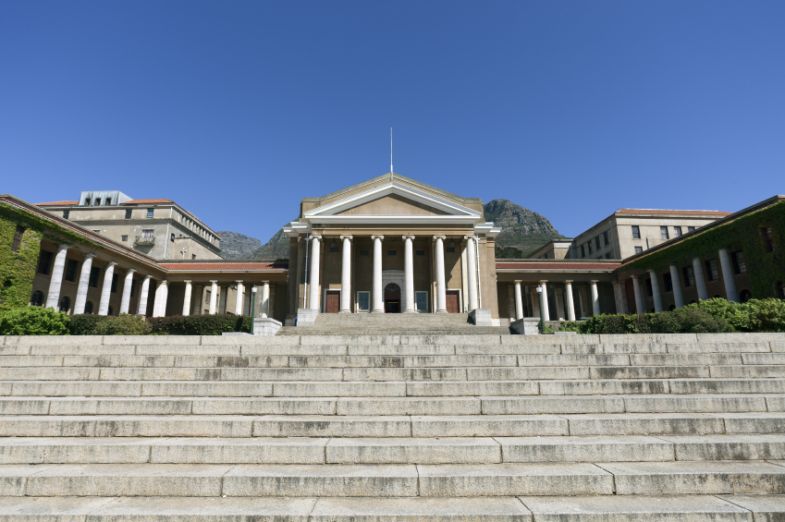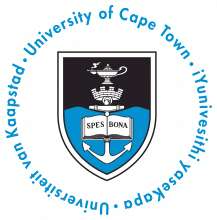The leaving ceremony for vice-chancellor Mamokgethi Phakeng’s predecessor was disrupted by protesters and had to be cut short. One student said it was the perfect chance for the new v-c to understand what she was facing.
With its grand Georgian buildings and lush green lawns set against the slopes of Table Mountain, the University of Cape Town (UCT) campus is described by some as the most beautiful in the world. When Phakeng stepped up to the position of vice-chancellor in 2018, it was three years after student activist Chumani Maxwele threw a bucket of faeces in the bronze face of Cecil Rhodes; the university was not a tranquil place.
Maxwele’s act sparked a series of demonstrations at UCT and beyond, initially over the statue of Rhodes – one of the main architects of South Africa’s segregation – but evolving to address racism in higher education, rising tuition fees and the decolonisation of the curriculum. Campus buildings were occupied, artworks burned, rocks thrown. There were university closures, riot police, arrests and the shocking suicide of a black UCT academic.
THE Campus views: Fellow vice-chancellors, we must lead the charge on equality
As a black woman, Phakeng says the young protestors saw in her a liberator who would represent their views and work to tackle racism from the inside. But as an academic scholar with a strong research background – she was the first black woman in South Africa to gain a PhD in mathematics – the scientific community saw a champion of knowledge who would prioritise scholarship over transformation of the university.
“Each of the two groups expected that I would be the answer,” she says.
So how has Phakeng balanced the needs of various factions, while trying to keep the peace and develop a more inclusive culture at UCT?
Maintaining order
Phakeng carries the weight of high expectations – in her words she is “walking a tightrope between the picket line and the boardroom” – although she seems to accept that she cannot fully please either group.
Her main peacekeeping strategy has been to meet regularly with those involved in the protests, aiming to dampen down any simmering disputes before they erupt.
Each quarter she meets with the black academic caucus and, separately, the union leaders to “build trust”. Every fortnight she and her whole executive team meet with the Student Representative Council. For an hour they discuss an agenda set by the students, in a meeting chaired by another member of staff, “so that it's not me who’s chairing and there's a power imbalance”.
“It can prevent a disaster that way,” she explains. “I know how I feel when I’m not listened to.”
The latest university figures report that 45 per cent of students at UCT are black. But, for Phakeng, inclusivity is not only about levelling up the demographics of students and staff, it is about institutional culture change.
“Even if we bring people from previously marginalised groups…in terms of ideology and ways of being and doing, they may be still very colonial, because education has been that way,” she says.
“That kind of [demographic] transformation is important but it’s not enough.”
Culture change
Over the past year, Phakeng has put particular effort into engineering culture change in one area of the university: the senate.
Previously, only full professors qualified to be members of the senate and UCT’s main academic body was disproportionately white; so Phakeng changed the rules so that each department could nominate two members who were not full professors and were from a marginalised group.
An interesting dynamic arose: two men began to dominate the discussions, one a white professor and one a black academic, both of whom Phakeng says were overbearing in the way they communicated with other members of the senate. Other than these two, the meetings were eerily silent.
This was a problem for Phakeng, because of the senate’s direct impact on the university and because of what it represents.
“If senate gets weak, my view is the university gets weak. I don’t want a senate that’s quiet,” she says. “To change the academic culture at UCT, we've got to set the tone at senate of how to engage even when we disagree with people.”
She embarked on a tour of university departments, giving a talk she entitled “The violence of silence in senate”, seeking to discover why people were hesitant to speak. They were frank with her: some black academics felt intimidated and didn’t want to be picked on like she was. Others said: “I’m a white male, and I’m about to retire next year. What do I have to say? I’m cancelled, the whole country, the whole world has cancelled me.”
These meetings led to several changes, including an induction session on the purpose of senate for all members and an agreement to draw up a code of participation, violation of which will mean members are asked to leave the meeting.
They have had two senate meetings since the tour, which she says were “vibrant” and full of varied voices.

Intellectual confidence
Another element of culture change is ensuring students from poor backgrounds do not feel excluded at UCT.
Phakeng describes high-achieving students who get to university and feel they don’t fit. “Because you come from a working-class background, you do things differently, everything is foreign; you get into class, your English is not good enough, you don’t understand the accent of some lecturers.” They don’t have the confidence to ask about what they don’t understand and fall behind, she says.
“You can lose intellectual confidence and when you lose intellectual confidence, it's very easy that you fail, even though you wouldn't have failed under normal circumstances.”
Phakeng relates her own experience. Her first school was under a tree in a rural village; she walked 10 kilometres there and back each day. Poverty and apartheid meant that in her first 12 years of education she attended seven or eight schools.
As a postgraduate student at the University of Witwatersrand she was the only black woman in her class. When she had questions for the teacher, initially she didn’t have the confidence to ask them. “I’m supposed to know,” she thought.
So, how can UCT support students suffering with their intellectual confidence? Phakeng says that is the wrong thing to ask.
“That question makes an assumption that there's something wrong with the students. My view is that there’s something wrong with the university.” It is UCT that needs to adapt, she says.
There are many ways to adapt teaching for working class students, Phakeng adds. One example is that if an academic is not from South Africa, they should be aware that some students might not understand their accent. “So I draw attention to it and say: ‘As I'm from Turkey, some of you might not understand my accent. So if you don’t hear what I’m saying, please ask me to repeat,’” Phakeng says.
Intersectionality
While righting historic racial wrongs is, of course, a priority for UCT, Phakeng is acutely aware of intersectionality and ensuring the culture change involves other marginalised groups.
“Intersectionality is not always easy for previously marginalised groups to accept,” she says. “Because it means we’ve got to understand that [for example] someone living with disabilities who is white, actually they too have been in the margins in the past.
“Actually, they continue to be in the margins, even now after liberation, because the sector and the institutions in the universities are not really always geared up to serve them.”
She believes that when it comes to promoting inclusivity, allyship is important: “I understand that some men want to support me in my struggle as a black woman. And I should understand that they will make mistakes, but they should understand that it’s not my business to be understanding their intentions.” Equally important is admitting when you get things wrong, she believes.
Earlier this year, she caused a social media storm by inadvertently offending the trans community. In one of her regular Sunday Q&A sessions on Instagram (she has nearly 50,000 followers), Phakeng interviewed a urologist friend who carries out surgery for transgender people.
The doctor was sympathetic, outlining the problems with waiting times for surgery. But the trans community was angry none of them had been invited to participate.
At first Phakeng was adamant that she had been sensitive, but then she spoke to her sister who asked how she would feel if she found two men on Instagram talking about women’s genitalia in the same way.
“These people are fighting a much bigger battle. They have no time for your intentions,” her sister said. “The penny dropped!” Phakeng says, and she issued an unreserved apology.
Phakeng feels she has been extremely lucky in life – “the fact that I even escaped sexual abuse as a young person is miraculous” – and she attributes much of her success to her father, who took a loan from his workplace to pay for her to attend boarding school. She doesn’t want talented young people to lose out because they haven’t got support, and it is this that drives her to help students.
“They might not be as lucky as I have been…so I can be their luck,” she says.
This is part of our “Talking leadership” series of 50 interviews over 50 weeks with the people running the world’s top universities about how they solve common strategic issues and implement change. Follow the series here.
Register to continue
Why register?
- Registration is free and only takes a moment
- Once registered, you can read 3 articles a month
- Sign up for our newsletter
Subscribe
Or subscribe for unlimited access to:
- Unlimited access to news, views, insights & reviews
- Digital editions
- Digital access to THE’s university and college rankings analysis
Already registered or a current subscriber?










